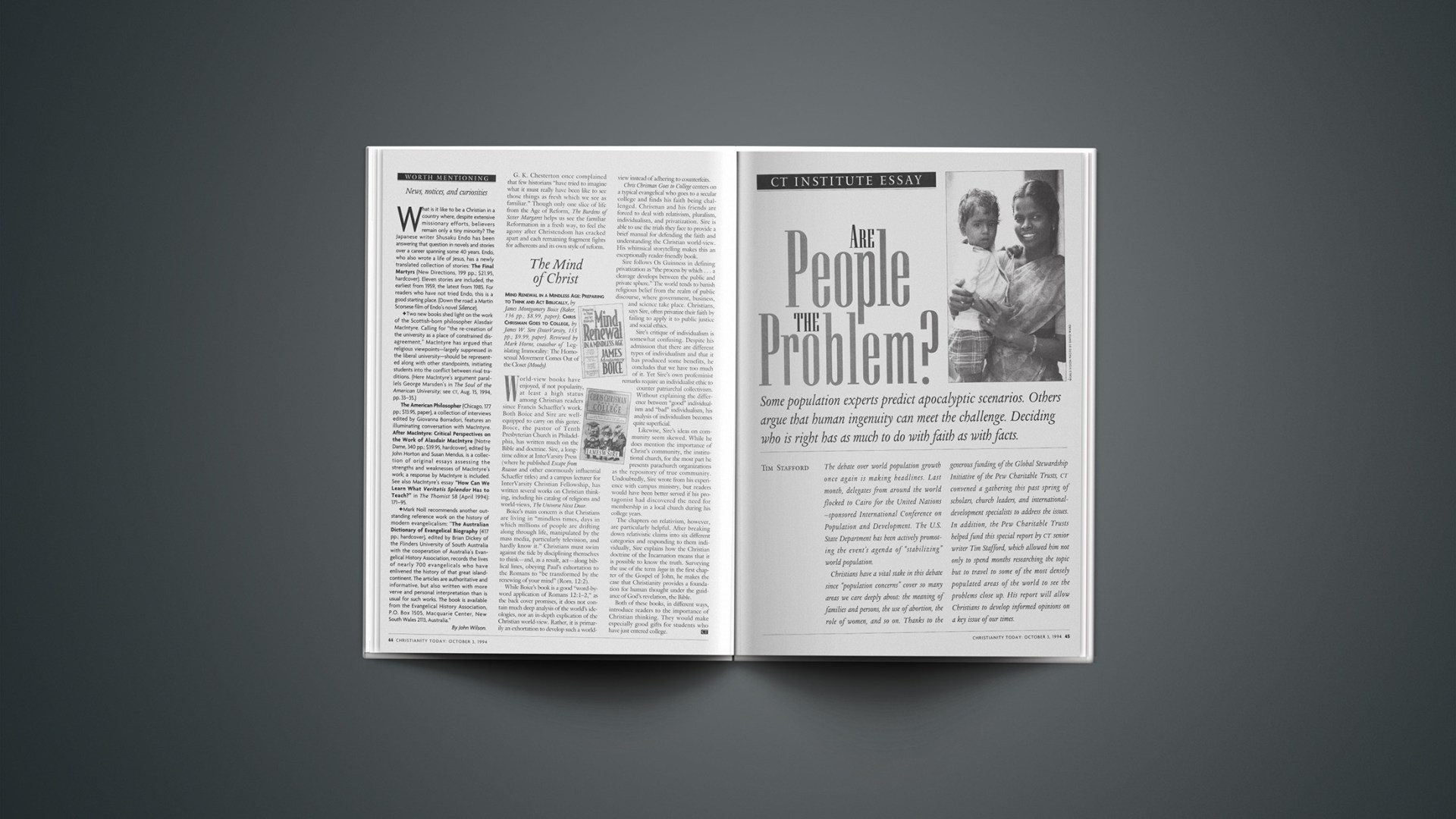“Mind Renewal In A Mindless Age: Preparing To Think And Act Biblically,” by James Montgomery Boice (Baker, 136 pp.; $8.99, paper); “Chris Chrisman Goes To College,” by; James W. Sire (InterVarsity, 155 pp.; $9.99, paper). Reviewed by Mark Horne, coauthor of “Legislating Immorality: The Homosexual Movement Comes Out of the Closet” (Moody).
World-view books have enjoyed, if not popularity, at least a high status among Christian readers since Francis Schaeffer’s work. Both Boice and Sire are well-equipped to carry on this genre. Boice, the pastor of Tenth Presbyterian Church in Philadelphia, has written much on the Bible and doctrine. Sire, a longtime editor at InterVarsity Press (where he published “Escape from Reason” and other enormously influential Schaeffer titles) and a campus lecturer for InterVarsity Christian Fellowship, has written several works on Christian thinking, including his catalog of religions and world-views, “The Universe Next Door.”
Boice’s main concern is that Christians are living in “mindless times, days in which millions of people are drifting along through life, manipulated by the mass media, particularly television, and hardly know it.” Christians must swim against the tide by disciplining themselves to think—and, as a result, act—along biblical lines, obeying Paul’s exhortation to the Romans to “be transformed by the renewing of your mind” (Rom. 12: 2).
While Boice book is a good “word-byword application of Romans 12: 1-2,” as the back cover promises, it does not contain much deep analysis of the world’s ideologies, nor an in-depth explication of the Christian world-view. Rather, it is primarily an exhortation to develop such a worldview instead of adhering to counterfeits.
“Chris Chrisman Goes to College” centers on a typical evangelical who goes to a secular college and finds his faith being challenged. Chrisman and his friends are forced to deal with relativism, pluralism, individualism, and privatization. Sire is able to use the trials they face to provide a brief manual for defending the faith and understanding the Christian world-view. His whimsical storytelling makes this an exceptionally reader-friendly book.
Sire follows Os Guinness in defining privatization as “the process by which … a cleavage develops between the public and private sphere.” The world tends to banish religious belief from the realm of public discourse, where government, business, and science take place. Christians, says Sire, often privatize their faith by failing to apply it to public justice and social ethics.
Sire’s critique of individualism is somewhat confusing. Despite his admission that there are different types or individualism and that it has produced some benefits, he concludes that we have too much of it. Yet Sire’s own profeminist remarks require an individualist ethic to counter patriarchal collectivism. Without explaining the difference between “good” individualism and “bad” individualism, his analysis of individualism becomes quite superficial.
Likewise, Sire’s ideas on community seem skewed. While he does mention the importance of Christ’s community, the institutional church, for the most part he presents parachurch organizations as the repository of true community. Undoubtedly, Sire wrote from his experience with campus ministry, but readers would have been better served if his protagonist had discovered the need for membership in a local church during his college years.
The chapters on relativism, however, are particularly helpful. After breaking down relativistic claims into six different categories and responding to them individually, Sire explains how the Christian doctrine of the Incarnation means that it is possible to know the truth. Surveying the use of the term logos in the first chapter of the Gospel of John, he makes the case that Christianity, provides a foundation for human thought under the guidance of God’s revelation, the Bible.
Both of these books, in different ways, introduce readers to the importance of Christian thinking. They would make especially good gifts for students who have just entered college.
Copyright © 1994 Christianity Today. Click for reprint information.










